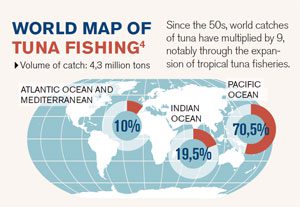Seafood Fraud
 Seafood fraud is the practice of misleading consumers about their seafood in order to increase profits. Along with ripping off shoppers, these actions can have negative impacts on marine conservation efforts and human health.
Seafood fraud is the practice of misleading consumers about their seafood in order to increase profits. Along with ripping off shoppers, these actions can have negative impacts on marine conservation efforts and human health.
Types of seafood fraud include substituting one species for another without changing the label, including less seafood in the package than is indicated on the label, adding too much ice to seafood in order to increase the weight and shipping seafood products through different countries in order to avoid duties and tariffs.
Although seafood is one of the most popular foods, consumers are routinely given little or no information about where their seafood is from. Plus, the information provided on seafood labels is often misleading or fraudulent.
DNA testing is now confirming anecdotal reports that seafood fraud is disturbingly widespread. Both scientists and amateur seafood sleuths have exposed seafood fraud across North America.
 Consequences
Consequences
Seafood fraud can happen at each step of the supply chain – the restaurant, the distributor, or the processing and packaging phase. Along with ripping off consumers, the consequences of seafood fraud include:
- Directly threatens human health. Swapping one fish species for another that may be riddled with contaminants, toxins or allergens can make people sick.
- Creates a market for illegal fishing by making it easy to launder illegally caught seafood products through the EU market. This undermines conservation efforts to prevent overfishing and accidental capture of at-risk species and hurts honest fishermen.
- Mislabeling fish makes it difficult for consumers to make eco-friendly choices. Market-driven conservation efforts depend on the consumer’s ability to make an informed purchase of particular species. This effort becomes nearly impossible when fish are mislabeled.
- Misleads consumers about the true availability of seafood and the state of the marine environment. Because mislabeling maintains the appearance of a steady supply of popular fish species despite severe overfishing, the general public is unaware that the species is in serious trouble.
 Overfishing continues to plague the world’s oceans, with 87% of fish stocks worldwide fully or overexploited. Despite growing concern about where our food comes from, consumers are frequently served the wrong fish – a completely different species than the one they paid for.
Overfishing continues to plague the world’s oceans, with 87% of fish stocks worldwide fully or overexploited. Despite growing concern about where our food comes from, consumers are frequently served the wrong fish – a completely different species than the one they paid for.

